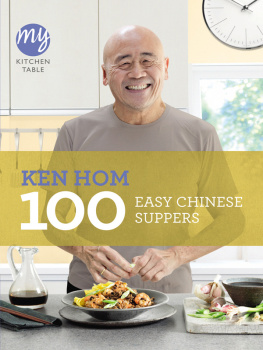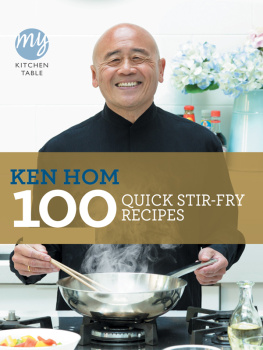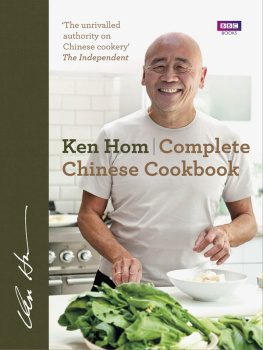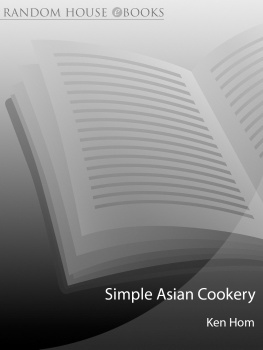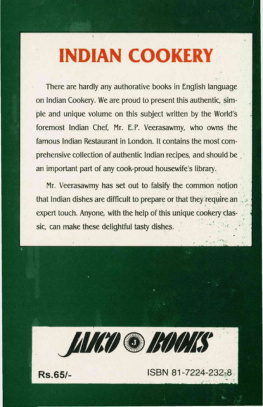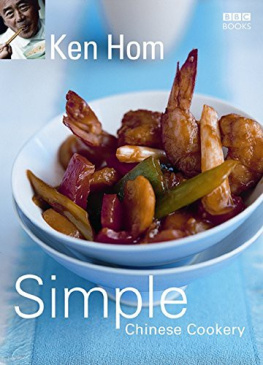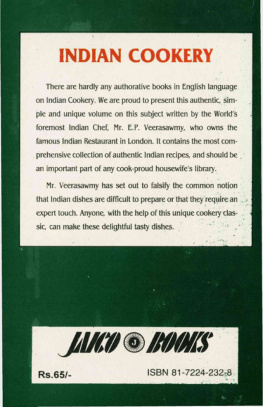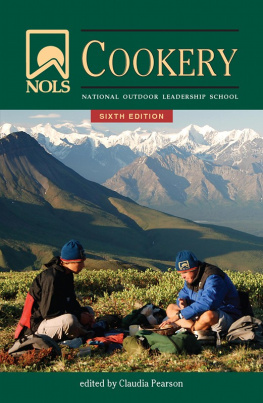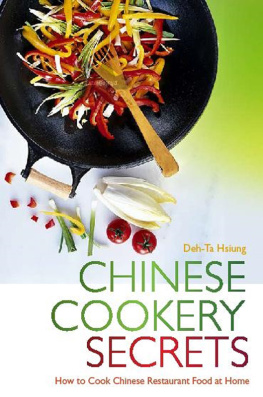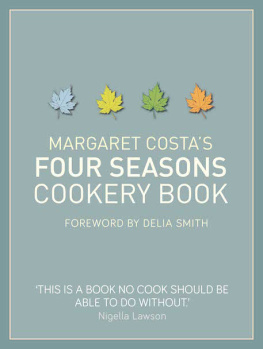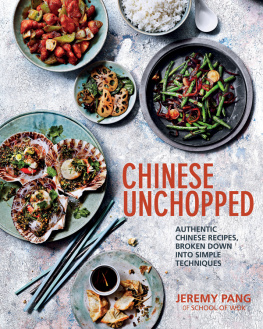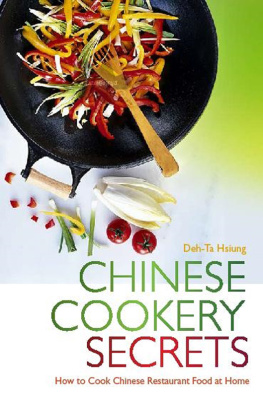Hom - Chinese Cookery
Here you can read online Hom - Chinese Cookery full text of the book (entire story) in english for free. Download pdf and epub, get meaning, cover and reviews about this ebook. year: 2016, publisher: Ebury Publishing, genre: Home and family. Description of the work, (preface) as well as reviews are available. Best literature library LitArk.com created for fans of good reading and offers a wide selection of genres:
Romance novel
Science fiction
Adventure
Detective
Science
History
Home and family
Prose
Art
Politics
Computer
Non-fiction
Religion
Business
Children
Humor
Choose a favorite category and find really read worthwhile books. Enjoy immersion in the world of imagination, feel the emotions of the characters or learn something new for yourself, make an fascinating discovery.

- Book:Chinese Cookery
- Author:
- Publisher:Ebury Publishing
- Genre:
- Year:2016
- Rating:4 / 5
- Favourites:Add to favourites
- Your mark:
- 80
- 1
- 2
- 3
- 4
- 5
Chinese Cookery: summary, description and annotation
We offer to read an annotation, description, summary or preface (depends on what the author of the book "Chinese Cookery" wrote himself). If you haven't found the necessary information about the book — write in the comments, we will try to find it.
Hom: author's other books
Who wrote Chinese Cookery? Find out the surname, the name of the author of the book and a list of all author's works by series.
Chinese Cookery — read online for free the complete book (whole text) full work
Below is the text of the book, divided by pages. System saving the place of the last page read, allows you to conveniently read the book "Chinese Cookery" online for free, without having to search again every time where you left off. Put a bookmark, and you can go to the page where you finished reading at any time.
Font size:
Interval:
Bookmark:

Contents


Ken Hom is widely regarded as one of the worlds greatest authorities on Oriental cuisine and this classic collection of Chinese recipes has sold over 1 million copies.
These essential recipes have been enjoyed from generation to generation, balancing colour, texture, aroma and flavour, and combining old favourites such as Cashew Chicken and Sichuan Prawns in Chilli Sauce with new recipes from the kitchens of Hong Kong and Taiwan such as Steamed Salmon with Black Beans and Mango Chicken .
Packed with indispensable information on ingredients, equipment and preparation techniques, Chinese Cookery is beautiful, authentic and easy-to-follow, and still holds its place as one of the best Chinese cookbooks ever published.
Ken Hom is regarded as one of the worlds greatest authorities on Oriental food and he still tirelessly travels the world making TV appearances, writing books and consulting on restaurants. In September 2007, he was awarded an honorary doctorate from Oxford Brookes University for his outstanding success with the international food world and he was also appointed Founding Patron of Oxford Gastronomica.
He began his culinary career in his uncles restaurant in Chicago and went on to teach at Californias Culinary Academy. After a spell studying gastronomy in France, an article in the New York Times led to his first television series in 1984. In total, he has presented five BBC TV series, which have been transmitted internationally and written over 30 cookery books.

Eggs are large
Wash all fresh produce before preparation
Spoon measurements are level
Conversions are approximate and have been rounded up or down. In a few recipes it has been necessary to modify them very slightly. Follow one set of measurements only; do not mix metric and imperial

preface
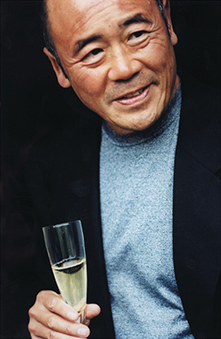
It is hard to believe that it has been almost a quarter of century since my first BBC series was first broadcast. I remember when writing the book and presenting the series how difficult it was to make Chinese cookery accessible to the general public. Most ingredients were unfamiliar and generally difficult to obtain.
I had to rely on substitute ingredients which naturally compromised the authenticity of Chinese cooking that I was trying to share with everyone.
In twenty-five years, the state of Chinese cookery in the West has in many ways mirrored the swift and incredible rise of China today. Awareness of Chinese ingredients and food has taken an enormous leap forward. The wok is now synonymous with a frying pan.
Formerly difficult ingredients such as ginger and chilli are now standard items on supermarket shelves. Even Chinese cabbage can be obtained from supermarkets. The word stir-fry has entered the lexicon of cookery language. Professional chefs everywhere are using five-spice powder, soy sauce, even Shaoxing rice wine. I would never have imagined this in 1983 when I first started writing this book, let alone that it would still be in print.
Having written the above, I must say that I am proud of the recipes in this book which have endured the test of time, all of them have been rigorously tested and they are classic Chinese recipes that represent a 5,000-year-old civilization that continues to evolve. Unlike Western cookery, our cuisine has never been codified, rather it is a cuisine that has been passed on by word of mouth. Each master chef has interpreted each dish in his own way, influenced by his environment, condition and the availability of ingredients. However, there have always been inviolable rules of techniques which have been the hallmark of true Chinese cooking.
Whether a Chinese chef is in Hong Kong, Chicago, Paris or Istanbul, what matters is how a dish is assembled. This begins with the basic fresh ingredients; correctly cut, then marinated in the case of meat. Then the oil is heated up and the meat is passed quickly through hot oil or water and drained. Next aromatics such as garlic, chilli or ginger are added, then the vegetables and sauces before, finally, returning the meat to the dish to finish. A perfect Chinese dish will emerge, redolent with hints of spices, a grilled, smokey flavour from the hot wok, and in total harmony with the sauce.
Can an ordinary home cook achieve this harmony and bliss? Yes, easily. My working mother often cooked dishes that were as good as any Chinese restaurant that I have been in. Why? Because she followed the principles of good cooking. I think this applies to any cuisine whether it be Italian or French. Remember when cooking at home, you are not trying to be a restaurant chef. This is everyday cooking. There are some more elaborate dishes for special occasions, but most of the recipes in the book are for regular use. I encourage you to use this book, not as a dogma, but as a guide and reference. Feel free to improvise, add your own touches and adjust as you see fit. Because then you will be a true Chinese cook!
I wish you happy cooking and good health.
Ken Hom
2008
introduction

Good food has been an important part of my life since my earliest childhood. I well remember my family gathered around the dinner table endlessly discussing what we were to eat, how it would be prepared, what our favourite dishes were, the best methods for cooking various delicacies, and so forth. In fact this is a common experience for most Chinese food is our favourite topic of conversation. For us food is more than a passion, it is an obsession, and good eating is believed to be essential to good living. We Chinese have an expression: Chi fan le mei you? which literally means: Have you eaten yet?. It is used universally as a greeting, just as one would ask in English, How are you?. It is also a wish for ones health and happiness. It is an entirely appropriate phrase since food to the Chinese has always meant much more than mere sustenance, and the processes of cultivating, selecting, cooking and consuming it are completely embedded into Chinese culture. Like all Chinese children, I absorbed a great deal of knowledge about Chinese cuisine simply by listening to the dinner table conversations of my relations. My real culinary training, however, took place in my uncles restaurant in Chicago where I started to work part-time at the age of eleven. In those early days I had all the routine, unpleasant jobs. I remember peeling hundreds of pounds of prawns, a tedious and painful chore. I also have memories of cleaning what seemed like mountains of huge sea snails which were delivered to the kitchen in enormous burlap bags. All the time I was thus employed I was surrounded by the wonderful aromas of the mouth-watering dishes being prepared by the expert chefs. Slowly they taught me why a particular spice went with a certain meat, why this sauce suited that vegetable: in short, the essence of Chinese cooking technique.
Font size:
Interval:
Bookmark:
Similar books «Chinese Cookery»
Look at similar books to Chinese Cookery. We have selected literature similar in name and meaning in the hope of providing readers with more options to find new, interesting, not yet read works.
Discussion, reviews of the book Chinese Cookery and just readers' own opinions. Leave your comments, write what you think about the work, its meaning or the main characters. Specify what exactly you liked and what you didn't like, and why you think so.

